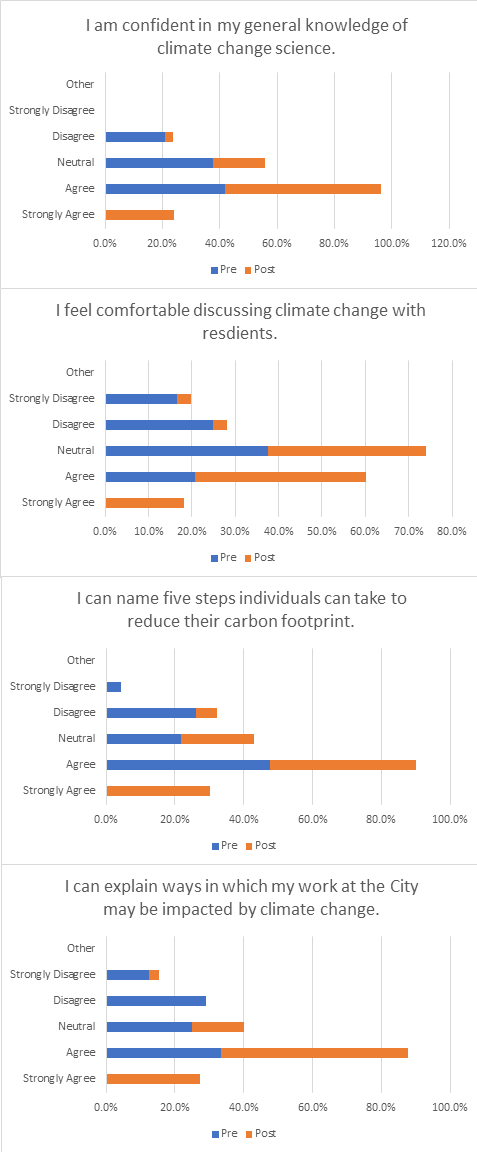Featured Image caption: L-R: Josh Papacek (University of Florida/IFAS); Ashley Smyth (University of Florida/IFAS), Colin Polsky (Florida Atlantic University); Alyssa Jones Wood (City of Hallandale Beach), Willm Martens-Habbena (University of Florida/IFAS) (Photo courtesy of City of Hallandale Beach)
The Hallandale Beach, Florida, project team achieved their first major project objective on May 8, 2019: hosting a “lunch & learn” to educate city staff about climate change. The staff workshop was planned to address a self-described lack of knowledge by city employees tasked with carrying out operations associated with the city’s climate resilience priorities.
Green Initiatives Coordinator, Alyssa Jones Wood, was joined by a panel of scientists from the University of Florida/IFAS and Florida Atlantic University: Josh Papacek, Ashley Smyth, Colin Polsky, and Willm Martens-Habbena. They used the workshop as an opportunity not only to educate staff on climate change and help them become comfortable using that knowledge when engaging with residents, but also to facilitate exploration of how climate change may or will impact their work.
When planning the workshop, the team recognized that busy schedules and different emphasis on climate change could limit participation by key individuals. So, with the support of the City Manager, it was required that each of the City’s 14 municipal department send at least one representative to the workshop. Ultimately 54 people attended the workshop, including several department heads and the City Manager himself.
A survey was distributed prior to the workshop to establish a baseline of employees’ climate change knowledge. A large number of respondents did not have any confidence in their knowledge of the role of greenhouse gases, climate science, or how they as individuals or city employees can affect (or be impacted by) climate change. In a post-workshop survey, those reservations were nearly eliminated, with responses demonstrating a shift toward strong confidence in knowledge and understanding.

Survey results courtesy of Hallandale Beach
The workshop was structured to include brief introductory information regarding local climate impacts, integrating climate change into daily activities, and trends in public perception and action. The remainder of the time was dedicated to Q&A and discussion. The team prepared a list of questions that they could discuss in advance but found that most of the questions the participants had were different than expected. For example, the panel was asked how global warming may effect volcanoes or vice versa. Other unexpected questions included questions regarding water quality and battery waste related to electric vehicles. As a result, the information presented during the workshop was different – and ultimately more useful – than what would have been shared if the structure had emphasized presentation over interaction. The only complaint Alyssa received was that it wasn’t long enough! Staff “loved the opportunity to learn by asking questions and many of them have asked when I’m going to do this event again.” While global climate change can come across as an overwhelming or saddening issue, staff emerged from the meeting energized by learning details and how they may make a difference both personally and professionally. Many staff members have expressed a newfound interest in climate change and have begun following the topic independently.
The team is now considering a follow-up workshop – or perhaps several – that would benefit the staff further, and considering how potential alternative formats could maximize value for participants. They’re also thinking about how the content of these events can be captured to be used by future staff. In the meantime, the questions posed by City staff are being used to generate a “Frequently Asked Questions” document available in both English and Spanish that can serve as a quick reference for common questions.
Upcoming plans for this project team include workshops and engagement/outreach efforts for the general public. These activities will likely be just as informative and surprising.
Recommendations for others planning to host a similar event:
- Food is an excellent tool to attract people who need extra incentive to attend an event.
- Build in time for people to arrive, get food and settle in.
- Provide a mechanism for individuals to write down questions in case they are uncomfortable asking the question out loud.
- Panel members should touch base before the event to review key points and share what they’re comfortable/able to speak about as an “expert”

